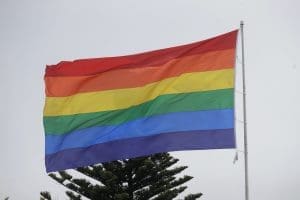House Democrats fight Pentagon's ban on Pride flags in the military
Democrats say the Department of Defense’s new policy excluding the display of Pride flags on military installations should be changed.

In a letter sent to Defense Secretary Mark Esper last week, 34 House Democrats called for the reversal of a recent policy that instituted a ban on the display of LGBTQ Pride flags on military installations.
The policy, announced on July 17 by Esper, included a list of the flags that are explicitly allowed on military installations. These included the flags of various branches of the military, U.S. states, and allied countries.
The list included neither the Pride flag nor the flags of Native Nations, which are therefore not allowed.
An official with the Defense Department told the New York Times in July, on the condition of anonymity, that although the policy did not specifically mention the Confederate battle flag, it was in fact aimed at banning it.
The letter from the lawmakers to Esper argued that in place of the broader prohibition, the Department of Defense should explicitly ban Confederate flags. A department spokesperson told the Modern Military Association of America, a nonprofit that focuses on equality for LGBTQ people in the military, that the policy is broad enough that it does effectively ban the Pride flag.
Donald Trump has expressed opposition to removing displays of Confederate symbols and to bipartisan congressional legislation that would require the renaming of military installations that bear the names of Confederate military leaders. The Defense Department policy avoids crossing Trump on the issue.
The letter, organized by Reps. Jackie Speier, Anthony Brown, and Chris Pappas, noted: “Minorities remain vastly underrepresented in commissioned officer and senior leader ranks. The action by the Department to implicitly ban the LGBTQ Pride flag only serves to create a discriminatory environment for LGBTQ service members and continue to isolate them from their fellow Airmen, Marines, Sailors, and Soldiers.”
The lawmakers said: “While we applaud the department for taking steps to remove the Confederate battle flag from our military bases, the action unnecessarily avoids a clear rebuke of this oppressive symbol while simultaneously limiting how service members can freely express themselves in line with our values.”
They added, “The department must have the strength and courage to be able to simultaneously stand against a symbol of hate and oppression in the Confederate battle flag while allowing the display of support for civil rights, equity and justice.”
In response to a request for comment, a Defense Department spokesperson said, “As with all congressional correspondence, we will respond directly to the authors of the letter.”
Jennifer Dane, interim executive director of the Modern Military Association of America, said that whatever the intent of the policy was, it sends the wrong message to LGBTQ service members: “Whether intentional or not, by banning this flag he told tens of thousands of LGBTQ American patriots that their services and the symbols that they use are divisive and unwelcoming and undeniably wrong.”
Dane noted some of the injustices LGBTQ people have faced in the U.S. military over the years, including what was known as the “lavender scare,” the removal beginning in the 1950s of gay people from government and military service; the “Don’t Ask Don’t Tell” policy that permitted gay people to serve in the military as long as they hid their sexual orientation; and Donald Trump’s ban on transgender people serving in the military.
With that history, Dane said, the display of a Pride flag carries a lot of meaning for service members.
“It’s more than just a rainbow flag. When you see it, you know that you’re accepted and included,” Dane said.
In June, Esper announced the formation of an internal department panel, the Defense Board on Diversity and Inclusion in the Military, tasked with reviewing diversity in the services and providing recommendations for how to increase it. Esper has asked the Modern Military Association of America to join the board as a consulting organization, which it has agreed to do. Dane said that if Esper takes this issue seriously, banning the Pride flag would be a step in the wrong direction.
To keep LGBTQ service members and recruit members of Generation Z, the cohort born after the mid-1990s, the military should allow the Pride flag to be displayed, Dane said. A greater percentage of Generation Z members than their predecessors say they know someone who uses pronouns other than he/him and she/her and believe people should be able to choose options other than “man” and “woman” when filling out forms that require an indication of gender.
“Long term, we’re about to enter into a recruitment process for LGBTQ service members for the next generation, which is Generation Z, and they’re the most gender-expansive generation we have. And even if they don’t identify in this community, they know a friend that is,” Dane said. “It makes the service less appealing for them to join if they see this discrimination happening toward their friends or family members … It does hit on the national security of our country. You’re not recruiting the best talent and you’re forcing people out of service.”
Published with permission of The American Independent Foundation.
Recommended

Alaska House committee advances, expands proposal to bar trans girls from girls sports
Amended bill would add elementary, middle school and collegiate sports to limits in place for high school
By Claire Stremple, Alaska Beacon - April 16, 2024
Bills targeting trans people are on the rise nationwide and in Alaska — most focus on children
House committee advances legislation that would restrict the rights of Alaska trans kids
By Claire Stremple, Alaska Beacon - April 01, 2024
Anti-abortion, anti-LGBTQ resolutions to be voted on at state Republican convention
A resolution to be considered by North Dakota Republican Party delegates at their upcoming convention would define life as beginning at fertilization and call for criminal penalties for “anyone who kills a pre-born human being.”
By Michael Achterling, North Dakota Monitor - March 26, 2024









































































